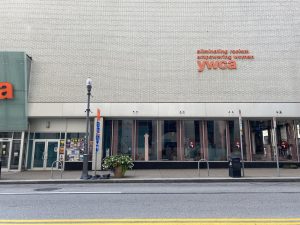Point Park students return to campus among new COVID-19 safety policies
September 9, 2020
Point Park students had the option to return to campus for in-person classes and residential living among the coronavirus pandemic, however, new safety protocols are to be followed to keep campus life viable.
On August 20, 2020 university President Paul Hennigan released in an email the “Operations Manual for Returning to Campus.” At a length of 67 pages, the manual discusses the expectations for students and faculty to preserve the safety and health of one another while navigating the academic year.
One of the most crucial policies to be instilled is the face covering policy. Students are to wear a mask on all university property, including both indoor and outdoor facilities with an exception of when they are eating.
Michael Gieseke, Dean of Student Life, discussed the possible repercussions students could face if one refuses to comply with the face mask expectation.
Gieseke explained that if a student denies the request of properly covering their nose and mouth, the Office of Student Conduct will be informed. The student will receive a letter from the Office of Student Conduct reminding them of the policies that are expected to be followed. Constant refusal to abide by the safety policies can result in university probation or suspension.
The only time a student on campus does not have to wear a mask is when they are in a “living space,” according to Gieseke.
“[A student’s] living space is only inside of their suite, apartment or dorm room,” Gieseke said.
He added that this excludes locations such as hallways, garbage rooms and laundry rooms.
Another safety protocol that shifted student life amid the coronavirus outbreak is the guest policy for those residing in residential buildings. Students living in on campus apartments, suites or dormitories are not permitted to have any guests in their rooms.
“These first few day is much more warnings, and we have been sending warnings to students through student conduct reminding them of the policy,” Gieseke said about the consequences of students visiting other residential rooms aside from their own. “We’re confronting quickly—even if it’s just one or two people, we really are confronting it immediately and asking the REs (resident educators) to take a quick stance with it. What we’re trying to do is set the tone now,” Gieseke added.
Resident educators will report any incidents of students living on their floor opposing the no guest policy to student conduct and further discussion about how staff will assess the situation will be taken there.
“We have been reiterating over and over again that because of COVID guests are not allowed in the room. It’s hard for freshmen to understand that because this is a time to have friends and not be homesick—it’s a difficult situation,” Nia Goodman, a senior resident educator of Thayer Hall, said.
Goodman said there have been situations in Thayer Hall where students were unaware of the no guest policy, but they ultimately adhered when reiterated the meaning of absolutely no guests.
“We want to be here, we want to be on campus so it’s just that important,” Ari Palmer, a junior resident educator of the Boulevard Apartments said in regards to reporting any incidents of violation of the no guest policy.
Students residing off campus are also responsible for following safety protocols amid the coronavirus pandemic and can be held accountable for violating policies in an off-campus setting.
“We have the authority that any off-campus behavior is still something that can be dealt with on campus,” Gieseke said.
Gieseke explained that any student organization, athletic team, or students living off campus hosting or attending large gathering events will be taken seriously with repercussions that can lead to suspension.
“As much time, effort, money and energy that was put into making this semester happen on campus—we need to do what we can now to keep that going,” Gieseke said.



















Donald Nania • Sep 9, 2020 at 10:26 AM
Great coverage and detailed information. Daughter Lauryn doing fine under her senior year restrictions.